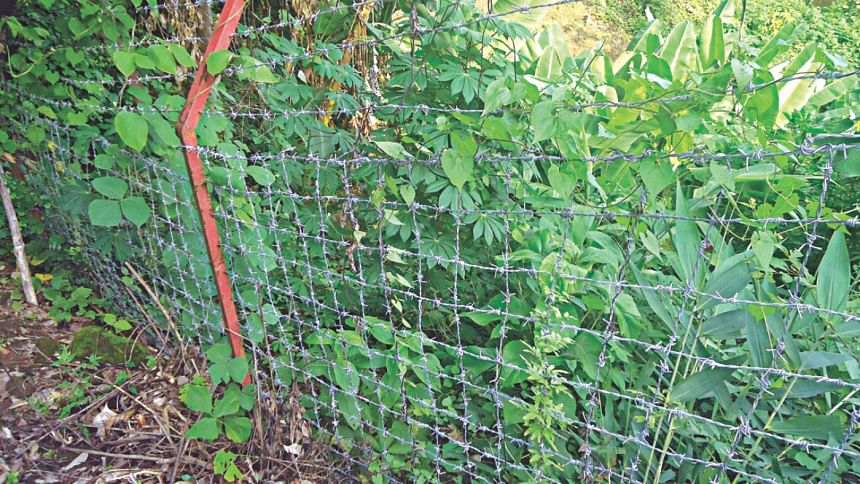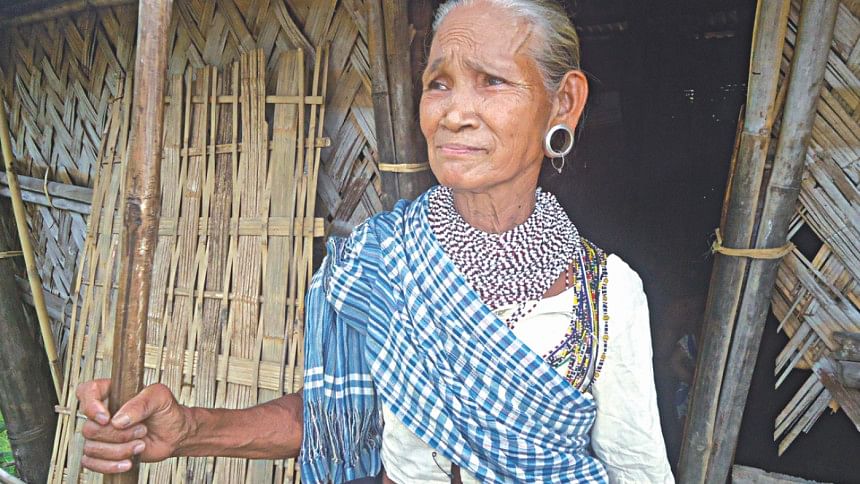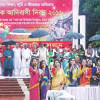3 indigenous villages face land grabbing

Cradled in the scenic hilly landscape and close to the town centre, a cluster of three indigenous villages of Bandarban sadar upazila faces grabbing by a resort owner who intends to build a five-star hotel in the area.
The three villages -- Saingya Tripura Para, Laimi Para, and Hati Bhanga Para – are home to 170 families and span over 250 acres of land. The panic-stricken families have already sought help from the local administration to stop the grabber.
In a complaint submitted to the deputy commissioner on June 9, they accused Jashim Uddin (Montu), chairman of Sylvan Wye Resort and Spa Ltd, of grabbing their jhum land, burning a rubber garden, and harassing them by filing a “false” case.
Birendro Tripura, village chief of Saingya Tripura Para, said, “Jashim’s goons burnt my rubber garden as I resisted their move. When I sought justice from police, they said a case was filed against me.”
“Jashim has also destroyed our natural water sources and blocked the roads between the three paras,” added Haolian Bawm, chief of Laimi Para.

Shurjo Sen Tripura of Saingya Tripura Para is one of the four men ac-cused in the case, which Jashim filed with Bandarban Sadar Police Station on January 29 for “illegal intrusion into his land.” Police had picked up Shurjo Sen the same day.
Jashim lives in Chattogram city and is the younger brother of Awami League lawmaker Nazrul Islam Chowdhury of Chattogram-14 (Chandnaish and parts of Satkania upazila).
Talking to The Daily Star, the lawmaker denied the allegations against Jashim, and said, “My brother is a good man. He never grabbed the land of any indigenous people in Bandarban.”
The village chiefs said Jashim started the grabbing almost two and a half years ago after selecting the land as a suitable location for the five-star hotel. He went slow at the beginning, they said. He first lent money to the indigenous families in distress in Saingya Marma Para, a neighbouring village. When the families failed to pay the money back, he evicted them and grabbed their land.
Saingya Marma Para is the latest victim of the 13 villages in Bandar-ban grabbed in the last two decades by settlers. The last six families of this Para were evicted in 2018, according to an indigenous rights group.
Jashim then put a barbed wire fence in the area as he continued to grab more land.
Refuting the allegations, Jashim claimed that he bought 60 acres of land from the indigenous families, taking permission from Chittagong Hill Tracts Affairs Minister Bir Bahadur U Shwe Sing, Bandarban mu-nicipality Mayor Islam Baby, and Chairman of Bandarban Hill District Council Kwe Shwe Hla.
He also accused the villagers of illegally entering “his land.”
But how he bought the land remains a mystery because only perma-nent residents of the hill district are eligible to buy land.
A gazette notification published on August 3, 1989 states that no land shall be transferred to a person who is not a resident of the hill dis-trict.
And the 1997 CHT peace accord defines a permanent resident. “‘Non-tribal permanent residents’ shall mean a person who is not a tribal but has legal land in the hill district and generally lives in the hill dis-trict at a specific address.”
So how did Jashim buy land despite being an outsider? He made fake documents to prove his residency in Bandarban.
One of his papers shows that Jashim has land in 337 No. Balaghata Mouja, just outside Bandarban district town. This correspondent visit-ed the area but did not find any land owned by Jashim. Moreover, his national identity card and birth registration certificate show he was born in Kanchan Nagar of Chandnaish upazila of Chattogram.
So Jashim is neither a permanent resident nor a legal land owner in Bandarban.
Not only did Jashim make fake documents, he also managed to get the approval needed to buy the land there.
According to the Bandarban Hill District Council Act 1989, “No land…within the jurisdiction of Bandarban Hill District shall be leased out, settled with, purchased, sold out or transferred otherwise with-out the prior approval of the Council.”
Asked how Jashim got the approval of the district council, Chairman of Bandarban Hill District Council Kwe Shwe Hla said, “We gave ap-proval after getting clearance from the deputy commissioner’s [DC] office.”
Seeking anonymity, an employee of the Bandarban DC office said some corrupt staffers of his office and the district council get fake documents approved in exchange for bribes.
Daudul Islam, deputy commissioner of Bandarban, said, “We are in-vestigating their allegations. I don’t want to make any comment now.”
Jashim said he bought the land the way others did. When told that his documents were fake, he said, “Many outsiders are buying jhum land this way in Bandarban. I did it too.”
CHT Affairs Minister Bir Bahadur said Jashim came here for tourism business and did not grab land. When asked how he bought the land, the minister said, “Ask the local administration who authorised Ja-shim to buy land in hills.”
Contacted, General Secretary of Bangladesh Adivasi Forum Sanjeeb Drong referred to two international conventions on the protection of indigenous people’s land.
According to Article 10 of the United Nations Declaration on the Rights of Indigenous Peoples, “Indigenous peoples shall not be forci-bly removed from their lands or territories. No relocation shall take place without the free, prior and informed consent of the indigenous peoples concerned and after agreement on just and fair compensa-tion and, where possible, with the option of return.”
He also cited Article 14 of the Indigenous and Tribal Peoples Conven-tion, 1989 by International Labour Organization, which states, “Gov-ernments shall take steps as necessary to identify the lands which the peoples concerned traditionally occupy, and to guarantee effec-tive protection of their rights of ownership and possession.”
Sanjeeb said, “We are informed that human rights of indigenous peo-ple in Bandarban are being violated and that they are facing eviction threats in the name of promoting tourism while many of the indige-nous families have already been evicted.”
He urged the government to stand beside the helpless indigenous people.
Talking to The Daily Star, National Human Rights Commission (NHRC) Chairman (in-charge) Nazrul Islam, said, “We have already informed the matter to the home ministry,” adding that they had asked the allegations of the eviction threats to be investigated.
JASHIM ‘DONATES’ LAND FOR POLICE CAMP
Villagers said Jashim gave less than an acre of the grabbed land to build a two-storey police camp. Lawmaker Bir Bahadur along with the Bandarban mayor laid its foundation stone in September last year.
Jashim said, “I have also donated around Tk 26 lakh to build the po-lice camp. I discussed the matter with top police officers and local leaders.”
Bandarban Superintendent of Police Jaker Hossain Majumdar acknowledged that Jashim gave land for the camp.
Shahidul Islam, officer-in-charge of Bandarban Sadar Police Station, said, “Police did not harass anyone. The local administration has or-dered a status quo under Section 145 [of the CrPC] on this land while we are doing our duty.”
VANISHING VILLAGES
Since the signing of the 1997 CHT peace treaty, 13 indigenous villag-es were grabbed in four upazilas of Bandarban by Bengalee settlers, said Jumlian Amlai, president of Parbatya Chattagram Forest and Land Rights Protection Movement, Bandarban chapter.
According to the organisation, the Paras are Amtali Mro Para, Mongbichar Baching Marma Para, Charigya Tripura Karbari Para, Lu-lainmukh Mro Para, and Sunong Mro Para of Lama; Ranghajiri Chakma Para, Dalujiri Marma Para, Badurjhiri Chak Para, Longadu Chak Para, Hamrajhiri Marma Para, and Sapmarajhiri Para of Nai-khyangchhari; Ukling Para of Alikadam, and Saingya Marma Para of Bandarban sadar upazila.
Khushi Ray Tripura, president of Bangladesh Tripura Kalyan Sangsad, Bandarban unit, said, “We want tourism to flourish in this region, but the authority of Sylvan Wye Resort and Spa Ltd is continuously grab-bing the indigenous people’s land.”

 For all latest news, follow The Daily Star's Google News channel.
For all latest news, follow The Daily Star's Google News channel. 






Comments